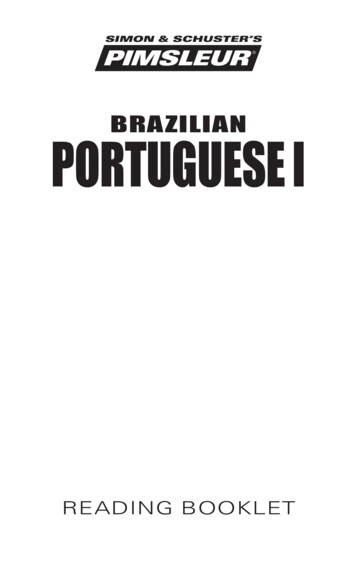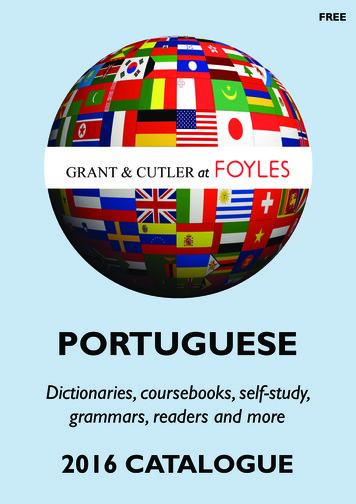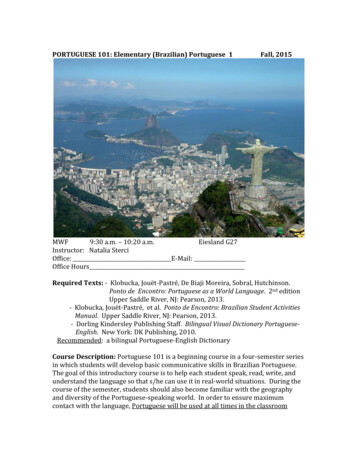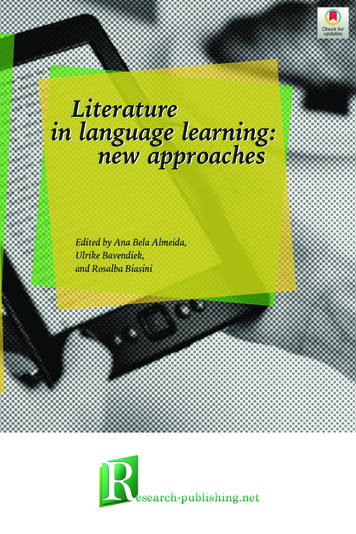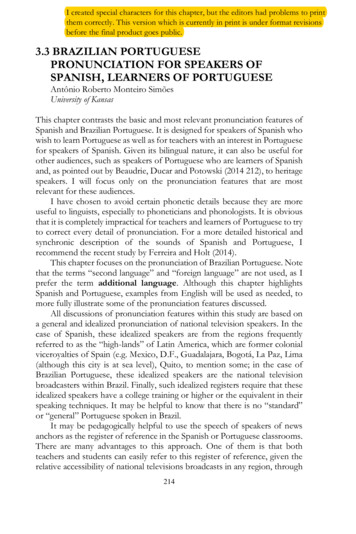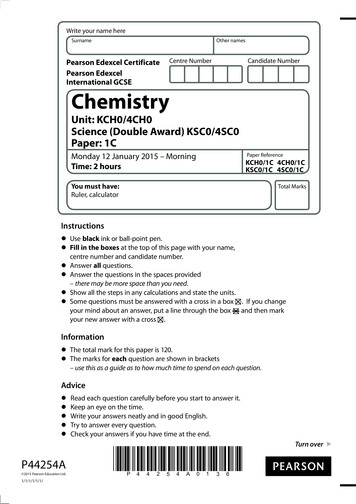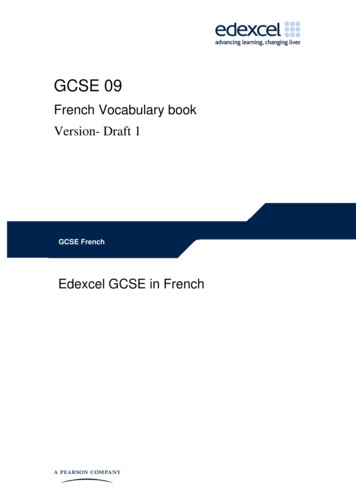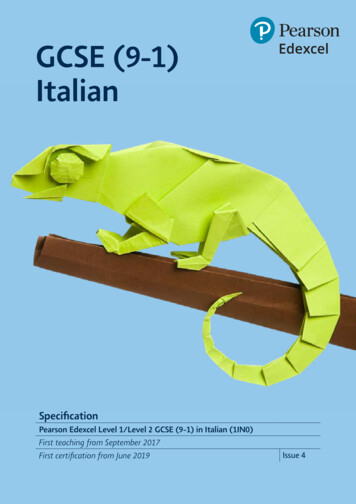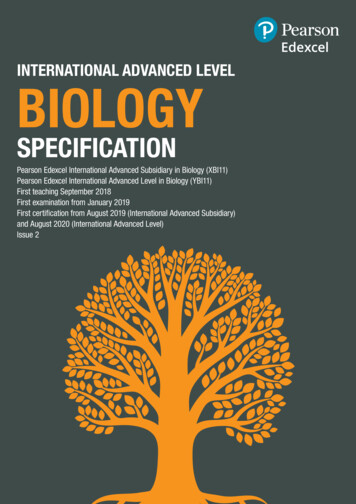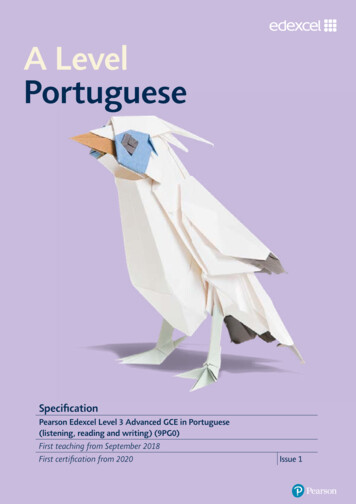
Transcription
A LevelPortugueseSpecificationPearson Edexcel Level 3 Advanced GCE in Portuguese(listening, reading and writing) (9PG0)First teaching from September 2018First certification from 2020Issue 1
Contents1Introduction2Why choose the Edexcel Level 3 Advanced GCE in Portuguese?2Supporting you in planning and implementing this qualification3Qualification at a glance427Subject content and assessment informationThemes, sub-themes and research subjects8Paper 1: Translation into English, reading comprehension and writing (researchquestion) in Portuguese10Paper 2: Translation into Portuguese and written response to works22Paper 3: Listening, reading and writing in Portuguese30Assessment Objectives37338Administration and general informationEntries38Access arrangements, reasonable adjustments, special consideration andmalpractice38Student recruitment and progression41Appendix 1: Prescribed literary texts and films45Appendix 2: Grammar list46Appendix 3: The context for the development of this qualification50Appendix 4: Transferable skills52Appendix 5: Level 3 Extended Project qualification53Appendix 6: Codes56
1 IntroductionWhy choose the Edexcel Level 3 Advanced GCEin Portuguese?We believe languages should appeal to all students. Our new Edexcel Level 3 Advanced GCEin Portuguese (listening, reading and writing) has been developed to inspire all students tohave an appreciation of the language, literature, film and culture of the Portuguese-speakingworld, i.e. the countries/areas where Portuguese is an official language.We have listened to feedback from the languages community – subject associations,academics and advisors, together with teachers and students – and have designed amotivating course of study that will enable your students to develop advanced levelknowledge and understanding of the Portuguese language, the culture of the Portuguesespeaking world, as well as practical and valuable language and transferable study skills. Thisspecification will help to prepare students for higher education and enhance theiremployability profile.Inspiring and engaging themes – our qualification features familiar and popular themes,as well as some new content that provides clear links to some of the most fundamental andinteresting aspects of the culture of the countries/areas where Portuguese is an officiallanguage.Popular literary texts and films – we offer a choice of literary texts and films that includescontemporary and more classic titles.Rewards creativity – our assessments place an emphasis on communication and grammar,as well as providing plenty of opportunities for students to apply their knowledgeindependently and creatively. Clear mark schemes encourage students to develop ideas, uselanguage to persuade and analyse, and give critical responses in their writing.Clear and coherent structure – our qualification has a straightforward structure with fourengaging themes: Mudanças na sociedade contemporânea; Cultura política e artística nospaíses de língua Portuguesa; Movimentos migratórios; Como a História moldou a Política.The four themes are studied alongside two works (either two literary texts or one literarytext and one film) and are assessed through three externally-examined papers.Manageable content – we have worked closely with teachers and students to ensure thatour content is manageable and appropriate so that you and your students can be confidentthat you have enough time to cover what you need to at the appropriate depth.Continuous progression – our content builds on the understanding developed atKey Stage 4 and gives students the opportunity to learn and apply important transferableskills in critical thinking and analysis, enabling them to make a smooth transition to the nextlevel of study. However, students do not need to have studied GCSE Portuguese to followthis course.2Pearson Edexcel Level 3 Advanced GCE in Portuguese (listening, reading and writing)– Specification – Issue 1 – March 2018 Pearson Education Limited 2018
Supporting you in planning and implementingthis qualificationOur Getting Started Guide, available on our website, gives you an overview of the newA Level qualification to help you get to grips with the changes to content and assessmentand to help you understand what these changes mean for you and your students.Teaching and learningThere will be lots of free teaching and learning support to help you deliver the newqualification, including: support with teaching literature and film support for the independent research.ResultsPlusResultsPlus provides the most detailed analysis available of your students’ examperformance. It can help you identify the topics and skills where further learning wouldbenefit your students.Get help and supportOur subject advisor service, led by Alistair Drewery, and our online community will ensurethat you receive help and guidance from us, and that you can share ideas and informationwith other teachers. You can sign up to receive e-newsletters to keep up to date withqualification updates and product and service news.Learn more at qualifications.pearson.comPearson Edexcel Level 3 Advanced GCE in Portuguese (listening, reading and writing) –Specification – Issue 1 – March 2018 Pearson Education Limited 20183
Qualification at a glanceContent and assessment overviewThe Pearson Edexcel Level 3 Advanced GCE in Portuguese (listening, reading and writing)consists of three externally-examined papers that assess listening, reading and writing skills.These assessments will be set and marked by Pearson.Students must complete all assessments in May/June in any single year.Paper 1: Translation into English, reading comprehension and writing (researchquestion) in Portuguese(*Paper code: 9PG0/01)Written examination: 2 hours 30 minutes40% of the qualification80 marksContent overviewSection A draws on vocabulary and structures from any one of the sub-themes within thefour themes listed on pages 8–9.Section B draws on vocabulary and structures across all sub-themes from within the fourthemes listed on pages 8–9.Section C is based on independent research selected and carried out by the students.The research must be based on one of the research subjects listed on pages 8–9.All aspects of the chosen research subject must be studied. Students use information fromtheir research findings and from an unseen written text to answer the question.Assessment overviewStudents are not permitted access to a dictionary during the examination or anydocumentation related to their researchThe examination is made up of:Section A: Translation into English (20 marks)An unseen passage to be translated from Portuguese to English.Section B: Reading (20 marks)A reading assessment based on a variety of text types and genres. Students must respondto a series of comprehension questions.Section C: Writing (research question) (40 marks)A reading and writing question based on an aspect of the student’s chosen research subject.Students read a text and then answer a question, incorporating information and ideas fromboth the text and their research findings.4Pearson Edexcel Level 3 Advanced GCE in Portuguese (listening, reading and writing)– Specification – Issue 1 – March 2018 Pearson Education Limited 2018
Paper 2: Translation into Portuguese and written response to works(*Paper code: 9PG0/02)Written examination: 2 hours and 40 minutes30% of the qualification110 marksContent overviewSection A draws on vocabulary and structures from any one of the sub-themes within thefour themes listed on pages 8–9.Sections B and C draw on the study of two discrete Portuguese works: either two literarytexts or one literary text and one film. The works must be taken from the list provided inAppendix 1: Prescribed literary texts and films. The literary texts listed include a range ofnovels, short stories and chronicles. All the films are feature length.Assessment overviewThis paper includes a translation exercise and two essays on either two literary texts or oneliterary text and one film (students must not answer questions on two films).During the examination, students are not permitted access to a dictionary or anydocumentation relating to the works.Section A: Translation into Portuguese (20 marks)Students translate an unseen passage from English into Portuguese.Section B: Written response to works (literary texts) (45 marks)Students must write an extended response on either one or two of the literary texts listed inAppendix 1: Prescribed literary texts and films.Students select one question from a choice of two for each of their chosen literary text(s).If a student answers questions on two literary texts, then they do not complete Section C.Section C: Written response to works (films) (45 marks)Students who answer only one question from a literary text in the Section B must write anextended response on one of the films listed in Appendix 1: Prescribed literary textsand films.Students select one question from a choice of two for their chosen film.Pearson Edexcel Level 3 Advanced GCE in Portuguese (listening, reading and writing) –Specification – Issue 1 – March 2018 Pearson Education Limited 20185
Paper 3: Listening, reading and writing in Portuguese(*Paper code: 9PG0/03)Written examination: 2 hours and 15 minutes30% of the qualification60 marksContent overviewSection A draws on vocabulary and structures across all sub-themes within the four themeslisted on pages 8–9.The Section B draws on vocabulary and structures from any one of the sub-themes withinthe four themes listed on pages 8–9. There is one unseen listening source and one unseenwritten source to which students must respond.Assessment overviewThis paper includes a listening comprehension and a question that assesses listening,reading and writing skills together.Students are not permitted access to a dictionary during the examination.Section A: Listening comprehension (30 marks)A listening assessment based on a recording that features male and female Portuguesespeakers. Students will respond to comprehension questions based on a variety of contextsand sources.The listening audio files for the sample assessment materials are available on thePearson Edexcel website.Section B: Listening, reading and writing question (30 marks)Students summarise a listening source and a text that are based on the same sub-theme.Students then evaluate the points of view in both sources, stating which views they agreewith and why.*See Appendix 6: Codes for a description of this code and all other codes relevant to thisqualification.6Pearson Edexcel Level 3 Advanced GCE in Portuguese (listening, reading and writing)– Specification – Issue 1 – March 2018 Pearson Education Limited 2018
2 Subject content and assessmentinformationQualification aims and objectivesThe aims and objectives of this qualification are to enable students to: enhance their linguistic skills and promote and develop their capacity for critical thinkingon the basis of their knowledge and understanding of the language, culture and society ofthe countries/areas where Portuguese is an official language. develop control of the language system to convey meaning, using written skills, includingan extended range of vocabulary, for both practical and intellectual purposes asincreasingly confident, accurate and independent users of Portuguese develop their ability to understand language in spoken and written form and to interacteffectively with users of Portuguese in writing develop language skills and strategies, including comprehension strategies such as usingcontextual clues and cues, and communication strategies to build fluency and confidencein writing develop speaking skills as part of their courses of study, although there will be noassessment of those skills engage critically with intellectually stimulating texts, films and other materials in theoriginal language, developing an appreciation of sophisticated and creative uses ofPortuguese and understanding them within their cultural and social context develop knowledge about matters central to the society and culture, past and present, ofthe countries/areas where Portuguese is an official language. translate texts from English into Portuguese and from Portuguese into English foster their ability to learn other languages equip themselves with transferable skills, such as autonomy, resourcefulness, creativity,critical thinking, and linguistic, cultural and cognitive flexibility, that will enable them toproceed to further study or employment develop their capacity for critical and analytical thinking through the language of study develop as independent researchers through the language of study.Pearson Edexcel Level 3 Advanced GCE in Portuguese (listening, reading and writing) –Specification – Issue 1 – March 2018 Pearson Education Limited 20187
Themes, sub-themes and research subjectsPapers 1, 2 and 3 will be based on content from the following four themes.The four themes address a range of content related to society past and present, as well asaspects of the political and artistic culture in the Portuguese-speaking world, i.e thecountries/areas where Portuguese is an official language.Themes 1, 3, and 4 focus on aspects of the society and politics of Portugal only. Theme 2focuses on aspects of the political and artistic culture of the Portuguese-speaking world,i.e. other countries and areas of the world where Portuguese is an official language as well asPortugal.Each theme is broken into two sub-themes and a research subject (highlighted in bold).Each sub-theme and research subject is divided into a series of aspects.Students are required to select only one research subject for Paper 1 and must base theirresearch on only one country/area. For their research, students must cover all three aspectsof the research subject.For Themes 1, 3 and 4, students must focus on Portugal only. For Theme 2, students mustfocus on either Portugal or one other country/area where Portuguese is an official language.Teachers should consider cultural sensitivities when giving guidance to students on selectingan appropriate research subject. Theme 2, is based on the wider Portuguese speaking world,i.e. countries/areas where Portuguese is an official language, including Portugal. If studentschoose the research subject from this theme, teachers should ensure that students select acountry or area where relevant material for the research subject is available.See pages 12–13 for further guidance on independent research.Tema 1: Mudanças na sociedade contemporâneaTheme 1 is set in the context of Portugal only. This theme covers Society past and present. Mudanças na estrutura familiarMudanças nas atitudes face ao matrimónio e às relações pessoais; os novos tiposde família; o papel da família alargada. O mundo do trabalhoA vida laboral e atitudes face ao trabalho; o desemprego; a igualdade de género.Tema de pesquisaA importãncia da educação após o ensino secundário em PortugalOpções no ensino superior e técnico; estágios; voluntariado.Tema 2: Cultura política e artística nos países de língua portuguesaTheme 2 is set in the context of the wider Portuguese-speaking world, i.e. countries/areaswhere Portuguese is an official language. This theme covers artistic culture (through music,festivals and traditions) and political culture past and present (through the media). If theresearch subject is chosen from this theme, it must focus on one of the countries/areaswhere Portuguese is an official language. Os mediaLiberdade de expressão; a imprensa escrita e online; o impacto na sociedade e na política. MúsicaMudança e evolução; o impacto da música na cultura popular; music festivals.8Pearson Edexcel Level 3 Advanced GCE in Portuguese (listening, reading and writing)– Specification – Issue 1 – March 2018 Pearson Education Limited 2
in Portuguese (listening, reading and writing) has been developed to inspire all students to have an appreciation of the language, literature, film and culture of the Portuguese-speaking world, i.e. the countries/areas where Portuguese is an official language . We have listened to feedback from the languages community - subject associations,
